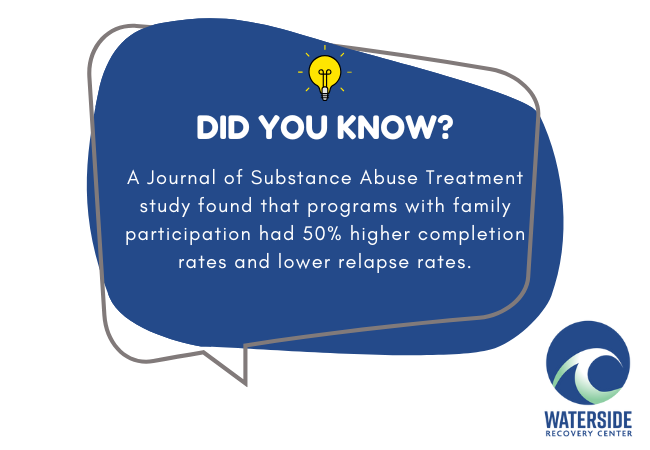Drug addiction impacts more than just the person struggling—it affects their entire family. Parents, siblings, spouses, and children all feel the emotional weight of addiction, often experiencing confusion, anger, helplessness, and heartbreak. But the same family system that suffers can also play a powerful role in the healing process.
At Waterside Recovery, we recognize that family involvement isn’t optional—it’s essential. Our programs are built on the understanding that long-term recovery is more successful when loved ones are engaged in treatment, communication is restored, and healthy boundaries are reestablished.
Whether you’re participating in our Day Treatment Program, Afternoon Treatment Program, or Outpatient Treatment Program in Massachusetts, family support is a critical component of every stage of care.
Why Family Support Matters in Addiction Recovery
Drug addiction can isolate individuals and create cycles of secrecy, denial, and emotional disconnection within families. When families are educated, included, and supported through the recovery process, they can:
- Improve communication and trust
- Reduce enabling or codependent behaviors
- Establish healthy boundaries and expectations
- Support relapse prevention efforts
- Heal from their own trauma caused by addiction
By involving families in treatment, our Massachusetts Addiction Treatment Center helps shift the family system from dysfunction to support.
Understanding the Impact of Addiction on Families
Addiction changes the dynamics of every relationship it touches. Families may experience:
- Emotional instability – Walking on eggshells, mood swings, and fear of confrontation
- Financial strain – Job loss, debt, or theft related to drug use
- Neglect or role confusion – Children taking care of parents, partners becoming caretakers
- Shame and stigma – Hiding addiction from friends, school, or community
- Trust issues – Due to lying, stealing, or repeated relapses
These effects don’t disappear just because treatment begins—which is why our Drug Addiction Treatment Program Massachusetts integrates family therapy and education early and often.
How Waterside Recovery Involves Families
We offer a range of services for family involvement, including:
Family Therapy
Licensed therapists facilitate sessions that address:
- Communication breakdowns
- Emotional healing and forgiveness
- Boundary-setting and accountability
- Navigating relapse, trust rebuilding, and expectations
Family Education Workshops
We help families understand:
- The science of addiction as a disease
- Triggers, cravings, and relapse
- Healthy support vs. enabling
- Tools for self-care and resilience
Weekly Family Check-Ins
Depending on the treatment level (PHP, IOP, or outpatient), families can attend:
- Progress updates and planning meetings
- Individualized support and feedback
- Q&A sessions with counselors
Our approach makes families active partners in care—not just spectators.
Family Involvement in Different Levels of Care
Day Treatment Program Massachusetts
- Intensive, full-day care for the client
- Weekly family therapy and involvement in treatment planning
- Ideal for families needing frequent updates and deeper healing
Afternoon Treatment Program Massachusetts
- Mid-level structure with daily group sessions
- Family sessions offered around flexible scheduling
- Supports clients reintegrating into home and work life
Outpatient Treatment Program Massachusetts
- Ongoing support with 1–3 sessions per week
- Families involved in long-term recovery planning and relapse prevention
- Ideal for post-treatment reintegration and communication repair
Each level supports continued family engagement for sustained recovery success.
The Benefits of Family Support in Recovery
Better Clinical Outcomes
Studies show that clients whose families participate in treatment are:
- More likely to complete treatment
- More likely to stay sober long-term
- Less likely to relapse
Improved Communication
Family therapy teaches tools for:
- Active listening
- Expressing concerns without judgment
- Conflict resolution and emotional regulation
Breaking the Cycle
Engaging family members in treatment helps prevent:
- Intergenerational trauma
- Future substance use in children
- Repeating the same unhealthy dynamics
Healing for Everyone
Recovery is not just for the person with addiction. Parents, partners, and siblings also need space to process grief, trauma, and hope for renewal.
Common Challenges Families Face (and How We Help)
“I don’t know how to help without enabling.”
We teach families how to provide support while maintaining firm boundaries and avoiding codependent patterns.
“I’m angry and hurt.”
Our therapists guide honest conversations where healing can begin and accountability can take root.
“I’m scared they’ll relapse again.”
We help families create realistic relapse prevention plans and reinforce that relapse is a risk—not a failure.
“I feel alone in this.”
Through group workshops and community support, families realize they are not alone—and that healing is possible for everyone involved.
Educating Families on the Science of Addiction
Many families blame themselves or their loved one for the addiction, assuming it’s caused by poor choices or lack of willpower. In reality, addiction is a chronic brain disease that alters judgment, impulse control, and emotional regulation.
At Waterside Recovery, we provide families with essential education to understand:
-
How opiates, alcohol, and other substances rewire the brain
-
Why addiction requires clinical care—not punishment
-
How mental health conditions (dual diagnosis) interact with substance use
-
What to expect emotionally during early recovery
This education builds empathy and clarity, which strengthens communication and patience during the treatment journey.
Addressing Grief, Trauma, and Guilt in Families
Addiction often brings with it years of unspoken grief, betrayal, and emotional trauma for loved ones. Parents may grieve the child they once knew. Spouses may feel abandoned or emotionally exhausted.
Our family therapy sessions allow loved ones to:
-
Express feelings of anger, hurt, or sadness in a safe, guided space
-
Understand how to process ambiguous loss (the person is present but not emotionally available)
-
Explore forgiveness and reconciliation at a realistic pace
-
Learn to heal without enabling or sacrificing their own wellbeing
This emotional work helps families move from pain to progress—together.
Rebuilding Roles and Routines at Home
When a loved one returns home after treatment, families must adjust routines and roles that may have become dysfunctional during active addiction.
We help families:
-
Establish healthy boundaries (e.g., curfews, expectations)
-
Reassign roles if caretaking dynamics were reversed
-
Create routines around recovery (e.g., attending meetings, therapy)
-
Manage conflict and expectations during reintegration
This practical planning ensures that the home becomes a supportive and recovery-aligned space, not one that reactivates stress or relapse triggers.

Engaging Siblings, Children, and Extended Family
While spouses and parents are often the first involved, siblings, children, and extended family also carry emotional wounds from addiction.
At Waterside Recovery, we provide:
-
Age-appropriate education for children or teens affected by a parent’s or sibling’s addiction
-
Sibling therapy sessions to address unresolved resentment or emotional distance
-
Grandparent or caregiver support when multigenerational impact exists
By including the whole family system, we create a more stable support network and prevent further emotional fragmentation.
Family Support Doesn’t End After Treatment
Healing continues long after formal care ends. That’s why we help families:
-
Attend alumni family events and workshops
-
Connect with ongoing family therapy through our Outpatient Treatment Program Massachusetts
-
Join support groups like Al-Anon or Families Anonymous
-
Create long-term family recovery plans
What to Expect from Family Therapy at Waterside Recovery
In a typical session, you can expect:
- Confidential, guided conversations in a safe environment
- Activities to rebuild trust and process difficult emotions
- Discussions on roles, boundaries, and expectations
- Planning for transitions home or into sober living
- Strategies to support long-term recovery as a family
These sessions are always client-centered and progress-focused.
Why Waterside Recovery Prioritizes Family
We believe that addiction is a family disease—but so is recovery. At Waterside Recovery, we help rebuild families with compassion, education, and active participation.
Here’s what sets us apart:
- Trauma-informed family therapy in all levels of care
- Customized education for families navigating addiction
- Integration with dual diagnosis and mental health treatment
- Flexible scheduling through our Afternoon and Outpatient programs
- Long-term support for both clients and families
Our role is not just to treat addiction—but to strengthen the entire system that surrounds our clients.
Final Thoughts
Addiction may have torn your family apart—but recovery can bring you back together. With the right tools, guidance, and support, families can transform pain into progress and fear into trust.
You don’t have to figure this out on your own. At Waterside Recovery, we’ll help your family heal alongside your loved one. Call 866.671.8620 today to learn how our family-centered approach can make all the difference.
FAQ on Family Support in Drug Addiction Treatment
Why is family involvement important in addiction recovery?
Family involvement improves communication, trust, and long-term recovery outcomes. It helps rebuild relationships and supports relapse prevention.
What if there’s a lot of hurt or trauma in the family?
That’s common. Family therapy offers a safe, guided space to address pain, anger, and fear—and start the healing process.
Will family therapy blame the family for the addiction?
No. Our approach is nonjudgmental. We focus on education, healing, and collaborative growth—not blame or shame.
Can siblings and children participate in therapy?
Yes. We offer age-appropriate education and therapy for siblings, children, and extended family members who’ve been affected by addiction.
What if my loved one doesn’t want family involved?
We encourage involvement when it’s appropriate, but always respect the client’s clinical needs. In many cases, clients come to welcome the support.
Is family therapy part of all levels of care?
Yes. From our Day Treatment Program to Outpatient services, family involvement is included at every stage.
Do you offer support after treatment ends?
Absolutely. We offer ongoing therapy, alumni events, and referrals to family-focused support groups to keep families engaged long-term.
What is a family recovery plan?
A custom plan we create with you to set expectations, boundaries, and communication strategies after your loved one returns home.


